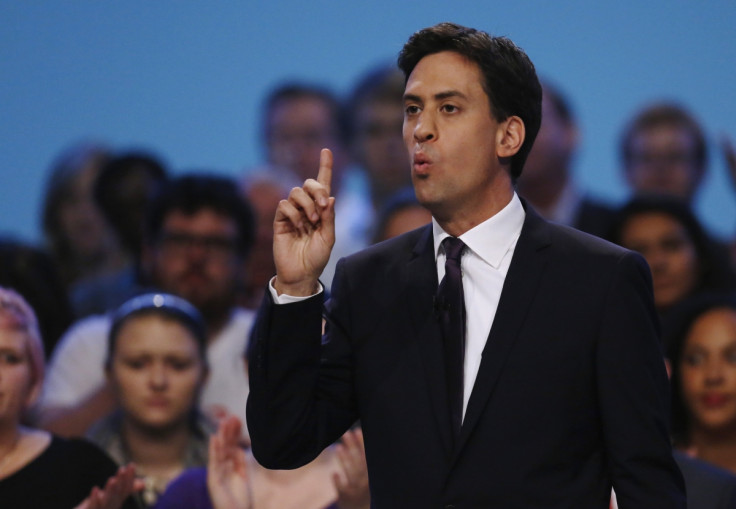Cost of Living Crisis 'Highly Unlikely' to End Before 2015 General Election

It is "highly unlikely" the squeeze on living standards will end before the 2015 general election, according to the Institute for Fiscal Studies, torpedoing the Conservatives' hopes that the emerging UK recovery will soon filter down into ordinary voters' pockets.
In the influential thinktank's Green Budget 2014 report, the IFS said the UK's median income per household is 6% lower in real terms than before the financial crisis.
British families have been hit by prices rising faster than wages, cuts to benefits, and the 2011 hike in VAT to 20%.
Labour has dubbed this squeeze the "cost of living crisis". Ed Miliband, Labour leader, is using it as a battleground ahead of the general election in the hope he can convince the public that the recovery is benefitting the few rather than the many.
"Looking forward, there is little reason to expect a strong recovery in living standards over the next few years," said the IFS.
"According to the Office for Budget Responsibility, real earnings are not expected to return to their 2009–10 levels until 2018–19. Further discretionary cuts to benefits and tax credits will put downward pressure on real incomes, particularly for low-income households.
"Given this, it seems highly unlikely that living standards will recover their pre-crisis levels by 2015–16."
The UK economy grew 1.9% in 2013, its fastest rate since the beginnings of the financial crisis in 2007.
However, wages were growing throughout the year at a rate of around 0.8%, well below consumer price inflation which had fallen to 2% in December.
Increases to benefits have also been capped at 1%, half that of inflation meaning a real terms cut.
Other changes, such as the spare room subsidy which is also known as the "bedroom tax" and child benefit, have slashed the amount of welfare support many households – mostly those with at least one person working – receive.
The IFS said it is those on the lowest incomes who have suffered the biggest impact on incomes, because they have seen less of the benefit of low mortgage costs amid the Bank of England's record-low base rate but have been hit harder by sharp rises in food and energy prices.
"Unless differences in inflation are reversed, this could mean that low-income households will see the largest falls in living standards over the period of recession and fiscal consolidation as a whole," said the IFS.
Supporting low-earners
Chancellor George Osborne has urged the Low Pay Commission to think about hiking the national minimum wage above inflation.
He hopes this, as well as rises to the personal allowance threshold at which an individual starts paying tax on their earnings, will convince voters the Conservatives are making them better off.
The IFS warned that hiking minimum wage – a move also favoured by Labour – carries the risk of limiting employment because firms have to pay higher salary bills and so take fewer people on.
Labour says it would also encourage firms to pay a "Living Wage". This is higher than minimum wage and is calculated from the cost of living of those on the lowest incomes.
"Despite its voluntary nature, the policy may distort employers' behaviour in undesirable ways: for example, firms may not employ some low-paid workers who they otherwise would have, as in order to get the tax rebate all employees must be paid the Living Wage," said the IFS.
"Employers may also simply alter the timing of wage increases to benefit from the policy, leaving pay unaffected in the long term. Overall, it is unclear whether the policy would raise revenue for the exchequer, as claimed by the Labour party."
The thinktank also said more hikes to the personal allowance threshold, which the government's Liberal Democrat coalition partners have called for, would "not be particularly effective in helping the low paid".
"The lowest-income 17% of workers will pay no income tax in 2014–15 anyway," said the IFS.
"A large majority of the giveaway would go to families in the top half of the income distribution, or with no one in work (mostly pensioners).
"And many of the lower-income gainers would gain only partially as their universal credit and/or council tax support would be automatically reduced."
Instead policymakers should support those on low incomes by offering better in-work benefits, which are "more precise and cost-effective".
Another move suggested by the IFS is lifting the threshold at which employees start paying national insurance.
"Aligning this threshold with the personal allowance would cut taxes for 1.2 million workers with earnings too low to benefit from an increase in the personal allowance, would benefit only workers, and would simplify the direct tax system," said the IFS.
© Copyright IBTimes 2025. All rights reserved.






















